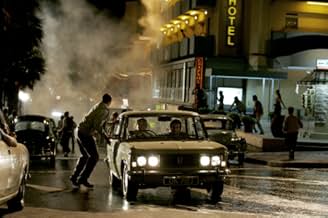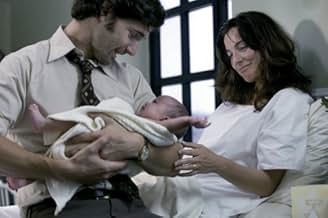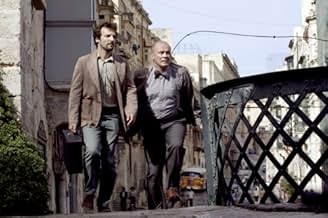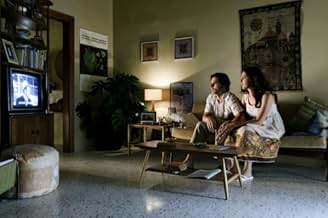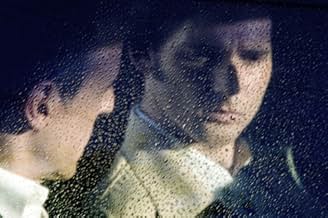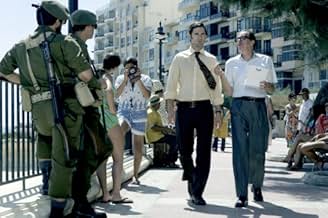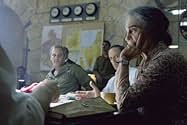Basato su una storia vera all'indomani del Settembre Nero, è la storia dei cinque uomini scelti per eliminare i responsabili di quel terribile giorno.Basato su una storia vera all'indomani del Settembre Nero, è la storia dei cinque uomini scelti per eliminare i responsabili di quel terribile giorno.Basato su una storia vera all'indomani del Settembre Nero, è la storia dei cinque uomini scelti per eliminare i responsabili di quel terribile giorno.
- Regia
- Sceneggiatura
- Star
- Candidato a 5 Oscar
- 14 vittorie e 75 candidature totali
Marie-Josée Croze
- Jeanette the Dutch Assassin
- (as Marie-Josee Croze)
Valeria Bruni Tedeschi
- Sylvie
- (as Valéria Bruni Tedeschi)
Amos Lavi
- General Yariv
- (as Amos Lavie)
Recensioni in evidenza
This movie relates more than just a story of "Vengeance". Besides proving that killing begets killing - it consists of numerous fine details that reveal the hard work done at getting to the depth of things:
For instance, only characters that get shot in the head slump to the ground. The rest take time to die - they walk a few steps, spurt blood and express a look of helplessness and inevitability before going out. Yes its horrifying to look at, which is the point, but it is also real.
Every character is different, and though common in their desire for vengeance, their temperaments are clearly distinguishable in the way the hit men approach their task. Even the terrorists are not stereotyped into hysterical, screaming lunatics. They range from the visibly nervous to the cool Abu Salameh with the movie star style. They are poets, intellectuals and guerrillas each with his story of the conflict. They speak passionately about home - a recurring theme, along with "family". Moreover, Spielberg does not attempt to mitigate the grotesque manner of their deaths, for the blood of the targeted men flows as freely as that of their victims - and when they are blown up, their body parts dangle from ceiling fans. You are not here to feel satisfaction over anyone's death, Spielberg says to the audience. Or as Caine would say in Kung Fu: "The taking of a life does no one honour."
There are no easy "shoot-em-dead" eliminations. There are neighbors, bystanders and obstacles that must be avoided and protected - with variable success. Innocent people may be harmed - and one has to live with that.
There are no mathematical certainties about the potential damage a bomb will cause.
Perspectives and convictions can change, sometimes regrettably. "Don't think about it - just do it" says Avner at one stage when a member of the team expresses doubts about a target's guilt. But at the end he wants evidence that the men he despatched were justifiably killed. Implausible? No; it is only when he has been reunited with his family and experiences the affection of wife and child that he allows himself to reflect from a different perspective - their targets had families too - what if he had killed the wrong men?
The paranoia that permeates the world of spies and assassins is built up gradually - to the point where every survivor mistrusts everybody else. One is doomed all one's life to walk with ears strained for following footsteps. The length of the movie creates the right atmosphere for this idea.
The end dissatisfies many because they would like a reassurance, a note of optimistic finality - but Spielberg rightly offers none. It would be dishonest of him to offer a false but comforting illusion.
It is interesting to contrast this movie with "Paradise Now" that has no violence, a modest budget, and views the conflict from the Palestinian camp. Both narrate completely different stories - yet, in their respective ways, both humanize their subjects, defuse myths about glory, and arrive at the same conclusion: "There's no peace at the end of this."
For instance, only characters that get shot in the head slump to the ground. The rest take time to die - they walk a few steps, spurt blood and express a look of helplessness and inevitability before going out. Yes its horrifying to look at, which is the point, but it is also real.
Every character is different, and though common in their desire for vengeance, their temperaments are clearly distinguishable in the way the hit men approach their task. Even the terrorists are not stereotyped into hysterical, screaming lunatics. They range from the visibly nervous to the cool Abu Salameh with the movie star style. They are poets, intellectuals and guerrillas each with his story of the conflict. They speak passionately about home - a recurring theme, along with "family". Moreover, Spielberg does not attempt to mitigate the grotesque manner of their deaths, for the blood of the targeted men flows as freely as that of their victims - and when they are blown up, their body parts dangle from ceiling fans. You are not here to feel satisfaction over anyone's death, Spielberg says to the audience. Or as Caine would say in Kung Fu: "The taking of a life does no one honour."
There are no easy "shoot-em-dead" eliminations. There are neighbors, bystanders and obstacles that must be avoided and protected - with variable success. Innocent people may be harmed - and one has to live with that.
There are no mathematical certainties about the potential damage a bomb will cause.
Perspectives and convictions can change, sometimes regrettably. "Don't think about it - just do it" says Avner at one stage when a member of the team expresses doubts about a target's guilt. But at the end he wants evidence that the men he despatched were justifiably killed. Implausible? No; it is only when he has been reunited with his family and experiences the affection of wife and child that he allows himself to reflect from a different perspective - their targets had families too - what if he had killed the wrong men?
The paranoia that permeates the world of spies and assassins is built up gradually - to the point where every survivor mistrusts everybody else. One is doomed all one's life to walk with ears strained for following footsteps. The length of the movie creates the right atmosphere for this idea.
The end dissatisfies many because they would like a reassurance, a note of optimistic finality - but Spielberg rightly offers none. It would be dishonest of him to offer a false but comforting illusion.
It is interesting to contrast this movie with "Paradise Now" that has no violence, a modest budget, and views the conflict from the Palestinian camp. Both narrate completely different stories - yet, in their respective ways, both humanize their subjects, defuse myths about glory, and arrive at the same conclusion: "There's no peace at the end of this."
7e-20
Munich is a well crafted film by the biggest director on the planet. Great pacing, suspense and cinematography. The biggest problem I had with the film is that I've seen it before. A little known film called THE SWORD OF GIDEON. Munich is almost a direct copy from the original. What a shame that Spielberg has to produce a remake of a much better film. Enough already with the remakes. People want to see original stories with fresh new ideas and writers. Why are independent films so successful, because the ones that are well made and tell a good story are box office darlings. It's amazing some Hollywood films have budgets north of 100 million. Just incredible how much money and time is wasted. If you want to understand what happened in the aftermath of Munich, rent THE SWORD OF GIDDEON.
10mlg-2
I am not a big Spielberg fan, and find he often goes for cheap emotional manipulation in his films, especially his endings. I was there fore amazed at the unflinching control he exercised in Munich, his utter unwillingness to flinch at complexities, his ability to dissect the ideological and moral sureties of all sides within the natural rhythms of the thriller genre. There is so much to praise in this film, because it is utterly seamless film-making with a keen eye for every little detail that never reveals the intense precision behind its construction.
While some have found the film "disengaged," I found that it pulled at the viewer's conscience through the central characters, not only Bana's Israeli agent Avner and his cohorts, most of who slowly find themselves gnawed by doubts of their mission's morality and effectiveness, but also smaller characters as well, drawn with indelible deftnessthe weary ex-French Resistance fighter now a trader in deadly information to stateless agents because of his cynicism about recurrent corrupt regimes replacing each other, or the PLO operative who debates Palestinian strategy and justification with Avner, who he wrongly believes to be a German left-wing terrorist who is "soft" on Jews because of the Holocaust. The economy of Spielberg's film-making is breathtaking in hindsight, so that what at first seems a relatively flat and emotionless exercise in historical recreation slowly seeps into one's subconscious and then moves upward, in quick bursts of sudden bursts of emotional and intellectual recognition by the viewer. These are real human beings, these are fighters in a war they believe in desperately and whose people have suffered terribly yet can find no real peace.
For this Kushner and Roth's screenplay must get much credit, the crisp narrative development intertwined with intellectually rigorous set pieces and flat-out armrest-clutching actions sequences. John Williams, who has managed to be understated in the past, is equally adept at building (or feinting) tension and subtly commenting on character development. Check out the slightly dissonant piano in the last scene to see what I mean. Longtime Spielberg collaborator Janusz Kaminski creates some amazing framing devices, especially as the action sequences are about to unfold and during moments of intimate conversations imbued with tension. Michael Kahn's editing is crisp and occasionally startling, as in the way the conclusion of the horrifically bungled Munich "rescue" is related. The retelling of the entire event from break-in to conclusion is doled out in bits and pieces in what seems at first an attempt to soften its impact but in the end, entwined as it is with all of the complicated issues, is finally revealed as a masterful means of achieving the fully deserved emotional impact within a complexly rendered ideological, moral and strategic matrix. There is not a false note in any of the acting, and the casting is uniformly spot-on.
About the politics. The radicals on either side will reject the film out of hand because it dares to render both sides as human and worthy of understanding. But attempting to understand choices of violence and vengeance as strategies does not in any way mean condoning them. Certainly, anyone who feels that the film somehow allows a viewer to walk away thinking that Black September was justified in its attack is probably projecting his or her fears about how some imagined uninformed viewer might react. Instead, the film demonstrates that whether one feels either or both sides justified it doesn't mannerneither side can win through violence at this point. This was Yitzhak Rabin's great insightyou don't make peace with your friends, you make peace with your enemies. His Israeli Jewish murderers wanted violence to continue, believing that only a continued state of war would keep Israel from giving back land they saw as bound up with their faith but which international law, historical study and the basic "facts on the ground" reveal to be bound to be returned to the Palestinians. Ariel Sharon, of all people, came to understand this, though without the larger vision and magnanimity of spirit that his fellow warrior Rabin discovered. Spielberg's message is clearthe extremists will choose war over peace, but must so many of us side with the extremists because of our fear of appearing weak or "giving in"? A last note on politicsthere is clear relevance to the United States' current predicament post-9/11. One can almost here Cheney or Bush making the speech made by Israeli premier Golda Meir in the film (an extraordinary piece of recreation that transcends mere imitation), only probably with more moral surety and less sense of resignation. Anyone paying attention to world reaction to Guantanimo, Abu Gharib, the bombing of Afghan and Iraqi villages and the spiriting away of suspected terrorists through "rendition" for torture in "friendly" nations must be aware that whether one leans hard or soft on such matters, there is going to be a price to be paid. The hardliners believe we will just keep punching and slugging and eventually the bad guys will go down; that they will not reproduce themselves like the many-headed Hydra or germinate and reproduce by the thousands in the fetid waters of our perceived hypocrisywhether you think it justified or not it doesn't matter. As Spielberg makes clear in this film, all that matters in the end is peace or violence, and whoever ultimately desires the former had better be damn sure that their use of the latter is measured by the awareness that it use will create debts that will need to be repaid in the end, and the debtors will most likely be the generations to come on all sides.
While some have found the film "disengaged," I found that it pulled at the viewer's conscience through the central characters, not only Bana's Israeli agent Avner and his cohorts, most of who slowly find themselves gnawed by doubts of their mission's morality and effectiveness, but also smaller characters as well, drawn with indelible deftnessthe weary ex-French Resistance fighter now a trader in deadly information to stateless agents because of his cynicism about recurrent corrupt regimes replacing each other, or the PLO operative who debates Palestinian strategy and justification with Avner, who he wrongly believes to be a German left-wing terrorist who is "soft" on Jews because of the Holocaust. The economy of Spielberg's film-making is breathtaking in hindsight, so that what at first seems a relatively flat and emotionless exercise in historical recreation slowly seeps into one's subconscious and then moves upward, in quick bursts of sudden bursts of emotional and intellectual recognition by the viewer. These are real human beings, these are fighters in a war they believe in desperately and whose people have suffered terribly yet can find no real peace.
For this Kushner and Roth's screenplay must get much credit, the crisp narrative development intertwined with intellectually rigorous set pieces and flat-out armrest-clutching actions sequences. John Williams, who has managed to be understated in the past, is equally adept at building (or feinting) tension and subtly commenting on character development. Check out the slightly dissonant piano in the last scene to see what I mean. Longtime Spielberg collaborator Janusz Kaminski creates some amazing framing devices, especially as the action sequences are about to unfold and during moments of intimate conversations imbued with tension. Michael Kahn's editing is crisp and occasionally startling, as in the way the conclusion of the horrifically bungled Munich "rescue" is related. The retelling of the entire event from break-in to conclusion is doled out in bits and pieces in what seems at first an attempt to soften its impact but in the end, entwined as it is with all of the complicated issues, is finally revealed as a masterful means of achieving the fully deserved emotional impact within a complexly rendered ideological, moral and strategic matrix. There is not a false note in any of the acting, and the casting is uniformly spot-on.
About the politics. The radicals on either side will reject the film out of hand because it dares to render both sides as human and worthy of understanding. But attempting to understand choices of violence and vengeance as strategies does not in any way mean condoning them. Certainly, anyone who feels that the film somehow allows a viewer to walk away thinking that Black September was justified in its attack is probably projecting his or her fears about how some imagined uninformed viewer might react. Instead, the film demonstrates that whether one feels either or both sides justified it doesn't mannerneither side can win through violence at this point. This was Yitzhak Rabin's great insightyou don't make peace with your friends, you make peace with your enemies. His Israeli Jewish murderers wanted violence to continue, believing that only a continued state of war would keep Israel from giving back land they saw as bound up with their faith but which international law, historical study and the basic "facts on the ground" reveal to be bound to be returned to the Palestinians. Ariel Sharon, of all people, came to understand this, though without the larger vision and magnanimity of spirit that his fellow warrior Rabin discovered. Spielberg's message is clearthe extremists will choose war over peace, but must so many of us side with the extremists because of our fear of appearing weak or "giving in"? A last note on politicsthere is clear relevance to the United States' current predicament post-9/11. One can almost here Cheney or Bush making the speech made by Israeli premier Golda Meir in the film (an extraordinary piece of recreation that transcends mere imitation), only probably with more moral surety and less sense of resignation. Anyone paying attention to world reaction to Guantanimo, Abu Gharib, the bombing of Afghan and Iraqi villages and the spiriting away of suspected terrorists through "rendition" for torture in "friendly" nations must be aware that whether one leans hard or soft on such matters, there is going to be a price to be paid. The hardliners believe we will just keep punching and slugging and eventually the bad guys will go down; that they will not reproduce themselves like the many-headed Hydra or germinate and reproduce by the thousands in the fetid waters of our perceived hypocrisywhether you think it justified or not it doesn't matter. As Spielberg makes clear in this film, all that matters in the end is peace or violence, and whoever ultimately desires the former had better be damn sure that their use of the latter is measured by the awareness that it use will create debts that will need to be repaid in the end, and the debtors will most likely be the generations to come on all sides.
Gandhi said, "An eye for an eye only makes the whole world blind." What distinguishes justice from vengeance? This echoes throughout Steven Spielberg's "Munich". "Munich" is powerful and perhaps Spielberg's most compelling and thought provoking work. He weaves a tapestry of political and social threads focusing on terrorism and the cost of violence. "Munich" is truly amazing in balancing linear storytelling and horrific acts of violence, demonstrating the impact of the aftermath. Spielberg's "Munich" seen through the eyes of Eric Bana's Avner is a powerful allegory that even in the most just and noble fights against terror we eventually become that which we despise. "Munich" really serves as a reminder. Mossad team leader Avner played by Eric Bana is absolutely riveting as the man who begins this righteous cause only to find that the cost is his soul. Anver asks, "When does it ever end?"
At the 1972 Olympic Games in Munich, Palestinian terrorists brutally murdered the Israeli wrestling team. This political statement was seen around the world and depicted in gory detail by Director Spielberg. Based on the book "Vengeance" by George Jones, the screenplay by Tony Kushner and Eric Roth tells the story of the aftermath of this tragedy. A great Lynn Cohen who plays Prime Minister Golda Meir says, "Every civilization finds it necessary to negotiate compromises with its own values." Poetic words for what follows are a search and destroy mission. The Mossad assembles a team lead by Avner (Bana) to track down and kill with extreme prejudice all those involved in the terrorist action in Munich. 11 names are identified for execution. These executions are also intended to serve as statements. Anver though an inexperienced operative and not an assassin is selected for the covert mission by Ephriam (the great Geoffrey Rush) for being a strong and effective leader of men. The assassin team is composed of Steve (Daniel Craigthe next James Bond), Carl (Ciaran Hinds), Robert (Mathieu Kassovitz), and Hans (Hanns Zischler). They are dissociated from the Mossad, i.e. they technically don't exist.
In accepting the lead, Avner must leave his beautiful and pregnant wife Daphna (a very strong Ayelet Zorer) for what could be a number of years. Carl has his doubts about Avner, telling him that he was chosen because he is a "good soldier". Soon Carl respects Avner for his quiet force and conscience. Attack of conscience and paranoia soon engulf the team as they become entrenched in the world of underground intelligence for hire. Avner pays large sums of money for information on the whereabouts of his targets from Louis (wonderfully shady Mathiew Amalric) and his wealthy Papa (weary and noble Michael Lonsdale). Avner soon finds that whomever he kills is eventually replaced, and that he and potentially his family is now a target for the terrorists he was assigned to hunt down and kill. The realization is that it truly never ends. Bana is amazing as a trapped animal in the scene in his thrashed apartmentsearching for weapons of his demise. Paranoia sets in, and the path of justice and vengeance become blurred. In a poignant scene Robert pleads to Avner, "When I lose my righteousness, I lose everything "
Nothing about "Munich" is easy, though it is simple. I believe that is Steven Spielberg's intention. "Munich" could be tighter in spots, though this does not diminish the movie's power and impact. Eric Bana emerges as the noble hero battling to salvage his own humanity and his very soul. "When does it ever end?" Perhaps even in the current context there is no real answermaybe what Spielberg is getting at. It is a reminder of our humanity, that even the most righteous cause may cost our souls. "Munich" is truly a powerful movie worth seeing.
At the 1972 Olympic Games in Munich, Palestinian terrorists brutally murdered the Israeli wrestling team. This political statement was seen around the world and depicted in gory detail by Director Spielberg. Based on the book "Vengeance" by George Jones, the screenplay by Tony Kushner and Eric Roth tells the story of the aftermath of this tragedy. A great Lynn Cohen who plays Prime Minister Golda Meir says, "Every civilization finds it necessary to negotiate compromises with its own values." Poetic words for what follows are a search and destroy mission. The Mossad assembles a team lead by Avner (Bana) to track down and kill with extreme prejudice all those involved in the terrorist action in Munich. 11 names are identified for execution. These executions are also intended to serve as statements. Anver though an inexperienced operative and not an assassin is selected for the covert mission by Ephriam (the great Geoffrey Rush) for being a strong and effective leader of men. The assassin team is composed of Steve (Daniel Craigthe next James Bond), Carl (Ciaran Hinds), Robert (Mathieu Kassovitz), and Hans (Hanns Zischler). They are dissociated from the Mossad, i.e. they technically don't exist.
In accepting the lead, Avner must leave his beautiful and pregnant wife Daphna (a very strong Ayelet Zorer) for what could be a number of years. Carl has his doubts about Avner, telling him that he was chosen because he is a "good soldier". Soon Carl respects Avner for his quiet force and conscience. Attack of conscience and paranoia soon engulf the team as they become entrenched in the world of underground intelligence for hire. Avner pays large sums of money for information on the whereabouts of his targets from Louis (wonderfully shady Mathiew Amalric) and his wealthy Papa (weary and noble Michael Lonsdale). Avner soon finds that whomever he kills is eventually replaced, and that he and potentially his family is now a target for the terrorists he was assigned to hunt down and kill. The realization is that it truly never ends. Bana is amazing as a trapped animal in the scene in his thrashed apartmentsearching for weapons of his demise. Paranoia sets in, and the path of justice and vengeance become blurred. In a poignant scene Robert pleads to Avner, "When I lose my righteousness, I lose everything "
Nothing about "Munich" is easy, though it is simple. I believe that is Steven Spielberg's intention. "Munich" could be tighter in spots, though this does not diminish the movie's power and impact. Eric Bana emerges as the noble hero battling to salvage his own humanity and his very soul. "When does it ever end?" Perhaps even in the current context there is no real answermaybe what Spielberg is getting at. It is a reminder of our humanity, that even the most righteous cause may cost our souls. "Munich" is truly a powerful movie worth seeing.
Another dip in the Spielberg pool and I come away drenched in emotion. I was a freshman in high school in Texas during the Munich games. I was stunned by the events and understood little.
Today, I am still stunned by Munich and every terrorist act that followed, but I understand so much more and grieve. Spielberg gives us a powerful glimpse into the meaning of home, family, honor, history, ethics, and faith. The movie is not about the Jews and Arabs. It's about human beings. It's about us.
The narrative is driven by our connection to Avner. We watch as Eric Bana opens himself up in a way that the likes of a George Clooney in Syriana only dreams of.
This is a must see.
Today, I am still stunned by Munich and every terrorist act that followed, but I understand so much more and grieve. Spielberg gives us a powerful glimpse into the meaning of home, family, honor, history, ethics, and faith. The movie is not about the Jews and Arabs. It's about human beings. It's about us.
The narrative is driven by our connection to Avner. We watch as Eric Bana opens himself up in a way that the likes of a George Clooney in Syriana only dreams of.
This is a must see.
Lo sapevi?
- QuizGuri Weinberg played his own father. He is the son of Moshe Weinberg, the Israeli wrestling referee and former champion, who died in the massacre when Guri was just one month old.
- BlooperThough they took the time to digitally add the World Trade Center to the final shot, they didn't edit out the Citigroup Center, Trump World Tower, and the Bloomberg building, which were built after the time of the movie.
- Versioni alternativeThe film was heavily censored in Malaysia for a 'U' rating. The uncut version is rated '18PL'.
- ConnessioniFeatured in Today: Episodio datato 27 luglio 2005 (2005)
- Colonne sonoreAin't No Sunshine
Written & Performed by Bill Withers
Courtesy of Columbia Reecords
By Arrangement with Sony BMG Music Entertainment
I più visti
Accedi per valutare e creare un elenco di titoli salvati per ottenere consigli personalizzati
Dettagli
- Data di uscita
- Paesi di origine
- Lingue
- Celebre anche come
- Untitled 1972 Munich Olympics Project
- Luoghi delle riprese
- Bugibba, Malta(Olympic Hotel in Cyprus)
- Aziende produttrici
- Vedi altri crediti dell’azienda su IMDbPro
Botteghino
- Budget
- 70.000.000 USD (previsto)
- Lordo Stati Uniti e Canada
- 47.403.685 USD
- Fine settimana di apertura Stati Uniti e Canada
- 4.152.260 USD
- 25 dic 2005
- Lordo in tutto il mondo
- 130.982.407 USD
- Tempo di esecuzione2 ore 44 minuti
- Colore
- Mix di suoni
- Proporzioni
- 2.35 : 1
Contribuisci a questa pagina
Suggerisci una modifica o aggiungi i contenuti mancanti


